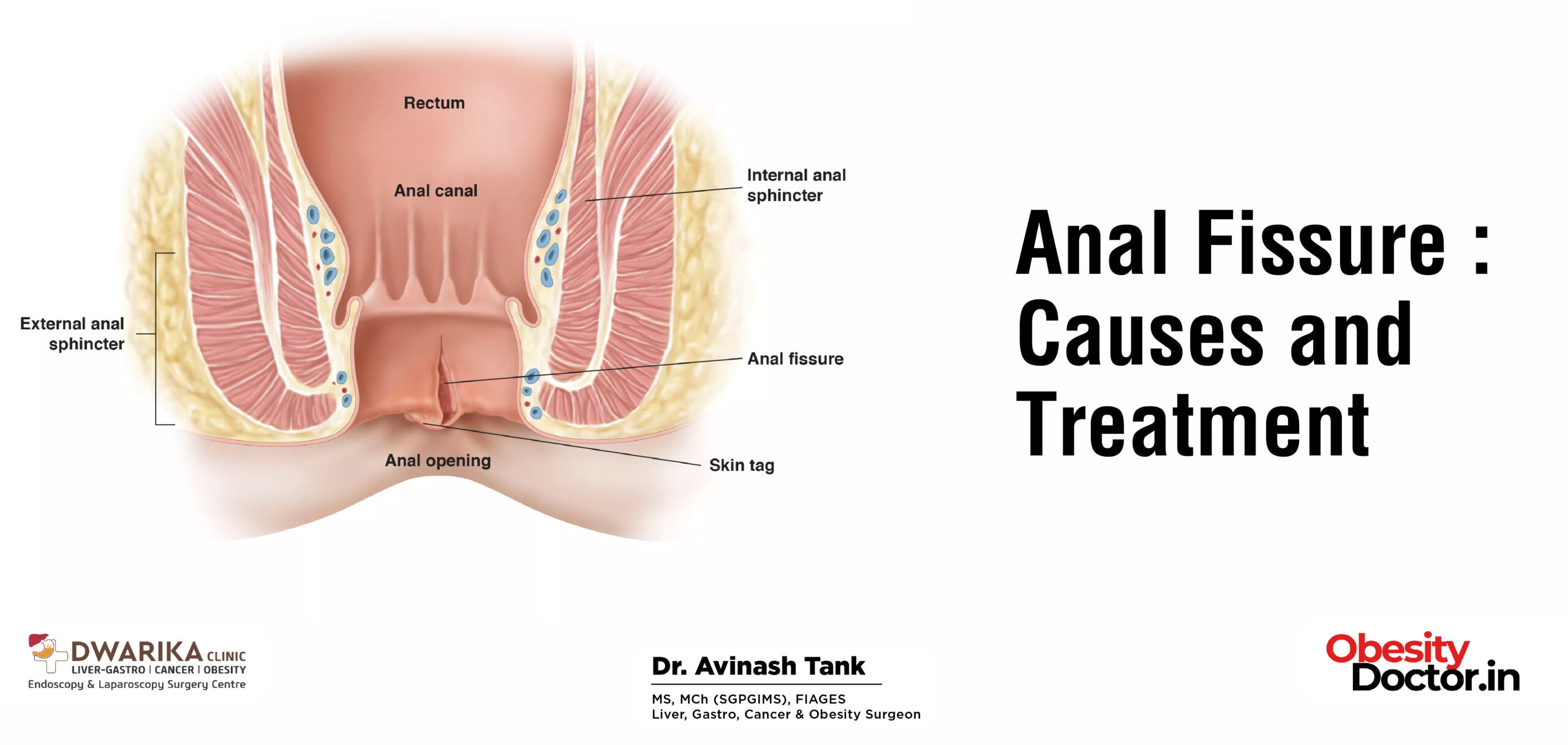
Reading Time: 2 minutes
Anal Fissure: Causes & Treatment
Anal fissures are a common but often uncomfortable and painful condition that affects many individuals. While they might not be a topic of casual conversation, understanding anal fissures, causes, and treatment options is essential for those who suffer from them.
Definition:
Anal fissures are small tears or cracks in the lining of the anus or the lower rectum.
Causes:
Anal fissures can result from various factors, including:
- Hard Stool: Passing hard, large stools can cause trauma to the anal lining.
- Chronic Diarrhea: Frequent bouts of diarrhea can irritate and weaken the anal area.
- Anal Trauma: Injury from anal intercourse or childbirth can lead to fissures.
- Inflammatory Bowel Diseases: Conditions like Crohn’s disease can increase the risk.
- Chronic Constipation: Straining during bowel movements can create or exacerbate fissures.
Symptoms of Anal Fissures
Common symptoms of anal fissures include:
- Rectal Pain: Sharp, stabbing pain during or after bowel movements.
- Bleeding: Bright red blood on toilet paper or in the toilet bowl.
- Anal Itching: Persistent itching in the anal area.
- Discomfort: A feeling of fullness or discomfort in the rectum.
Acute vs. Chronic Anal Fissures
Acute Anal Fissures
- Short Duration: Acute fissures are typically short-lived, lasting for a few weeks to a couple of months.
- Sudden Onset: They often develop suddenly due to a specific event or strain during bowel movements.
- Painful: Acute fissures are often extremely painful, causing significant discomfort.
- Good Healing Prospects: With proper care and treatment, acute fissures tend to heal well on their own.
Chronic Anal Fissures
- Long Duration: Chronic fissures persist for more than two months and may become recurrent.
- Persistent Pain: The pain associated with chronic fissures can be continuous and more intense.
- Difficulty in Healing: Chronic fissures are more resistant to healing and may require medical intervention.
- Risk of Complications: Left untreated, chronic fissures can lead to complications like anal stenosis (narrowing of the anal canal).
Diagnosis and Treatment
Diagnosis:
A healthcare provider can diagnose anal fissures through a physical examination and by discussing your symptoms. In some cases, additional tests like anoscopy or sigmoidoscopy may be recommended.
Treatment:
Acute Fissures:
- Stool Softeners: Keeping stools soft and easy to pass can aid healing.
- Topical Medications: Ointments containing nitroglycerin or calcium channel blockers can relax the anal sphincter and promote healing.
- Sitz Baths: Soaking in warm water can provide relief and improve blood flow to the area.
- Dietary Changes: Increasing fiber intake and staying hydrated can prevent constipation.
Chronic Fissures:
- Botox Injections: Botulinum toxin injections can relax the anal sphincter muscles.
- Lateral Internal Sphincterotomy (LIS): A surgical procedure to release the sphincter muscle and promote healing.
- Fissurectomy: Removal of the damaged tissue may be necessary in chronic cases.
Preventing Anal Fissures
- Maintain regular bowel habits to prevent straining.
- Stay hydrated and consume a high-fiber diet to prevent constipation.
- Practice good anal hygiene.
- Avoid excessive use of harsh or scented toilet paper.
Conclusion: Anal Fissure: Causes & Treatment
Anal fissures can be a source of discomfort and pain, but with the right knowledge and treatment, they can be managed effectively.
Understanding the difference between acute and chronic fissures is crucial, as it guides treatment decisions.
If you suspect you have an anal fissure, don’t suffer in silence – consult a healthcare professional for proper diagnosis and personalized treatment options.
Remember, maintaining anal health through proper diet, hydration, and hygiene is key to preventing these painful conditions.
